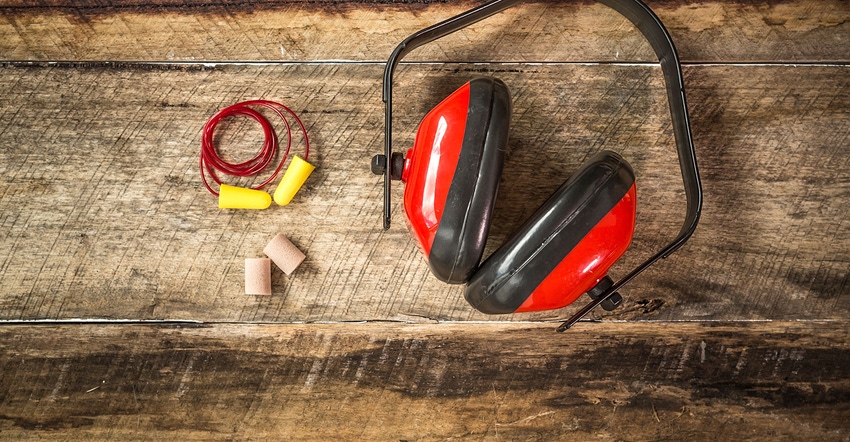
The rate of hearing loss among farmers is 72% higher than all other occupational groups, according to Marjorie McCullagh, a professor for the Occupational Health Nursing Program for the University of Michigan School of Nursing.
McCullagh spoke during a recent AgriSafe webinar on the importance of properly implementing hearing protection around the farm.
"Hearing loss is a long-standing problem for agriculture producers," McCullagh said.
How loud is too loud?
Noise exposure throughout your life has a cumulative effect on your hearing. Loud noises experienced at adolescence on into adulthood adds up into your cumulative noise exposure, which affects your ability to hear.
"Military veterans who are now farmers have the compounded effect from noise exposure from their military experience as well as farming," McCullagh said. "Most people know that noise causes hearing loss, but it also causes tinnitus or ringing in the ears. When sound is loud, it can damage our ears, but it can also damage the rest of the body."
Noise exposure impacts your whole body and contributes to cardiovascular disease, hypertension, obesity, and several other highly prevalent diseases.
Sound is measured in units called decibels. The bigger the number of decibels, the louder the sound.
"Ag producers are exposed to several sources of loud noise," she said. "Many of these noises are above 85 decibels, which is known to cause hearing loss and other problems.
"How can you tell if a noise is too loud, though? It's not too hard. If you must raise your voice to be heard by someone who's an arm's length away, then the noise is too loud."
Eighty-five decibels and higher are considered dangerous levels of noise. If you're around loud noise too long, it will likely damage your hearing. Hearing an extremely loud sound even one time, like an explosion, can cause hearing loss.
Examples of loud machines found on the farm include a tractor at 74 to 112 decibels, a combine at 85 to 105 decibels, a grain drier at 85 to 110 decibels, a chainsaw at 77 to 115 decibels, and a lawnmower at 90 decibels.
"Once your hearing is damaged, there's nothing that will make you hear as well as you once did," McCullagh said. "People are usually aware that being around loud noise is bad for your hearing. However, most people think that losing their hearing will be quiet. Surprisingly, that's not true at all. Most people with noise-induced hearing loss have a constant ringing or buzzing in their ears called tinnitus."
Tinnitus
Tinnitus is ringing, hissing, or buzzing in your ear. This occurs often after exposure to a loud sound, and often, the ringing goes away. However, the damage done by exposure to the sound does not. Sometimes the ringing will stay forever.
"Tinnitus is a signal to you that you have damaged your hair cells in your ears and, therefore, have damaged your hearing," McCullagh said. "We don't have any way to fix this with medicine or surgery."
The energy of noise causes changes to the nerves in the inner ear, the cochlea.
"Damage to the inner ear causes hearing loss and perhaps causes tinnitus as well," she said. "The good news is we're not doomed to hearing loss and tinnitus. We know that the effects of noise can be reduced by using hearing protection and other strategies. However, we know that these methods are highly underused among ag producers."
Preventing hearing loss
The best solution is to get rid of the noise or get away from the noise. However, this isn't possible when operating loud farm equipment. But using noise reduction earmuffs or earplugs can protect your hearing.
"Each type of hearing protection has its advantages and disadvantages, and everyone has their favorite, so you may have to experiment with several kinds before you find what you like," McCullagh said. "The best hearing protector is the one you'll use.
"Also, remember when you're selecting your hearing protection, more is not necessarily better, such as putting in earplugs and earmuffs on top. You want your hearing protection to bring down the noise level in your ears to a safe level, but you still want to be able to hear what's going on."
For example, when using a lawnmower at 90 decibels, wearing hearing protection that gives 5 to 10 decibels of protection is adequate because it takes it down to a safer level of around 80 decibels.
"You would still be able to hear what's going on around you," she said. "You're not looking for quiet or silence when you're wearing hearing protection. You want to bring the sound level down to a safe level and still be able to function in your environment."
Most people that use earplugs don't use them properly.
"Unfortunately, many people are trying to protect their hearing, but use hearing protection the wrong way," McCullagh said.
"First and most importantly, be prepared and keep your earplugs handy in case you are exposed to loud sounds. It's important to use them and even more important to use them properly.
"For the earplugs that look like little Christmas trees, hold the rigid stem in one hand and reach over your head with the opposite arm and pull the outer ear up and back. This straightens your ear canal, making it possible to seat the plug properly. Slowly insert the plug into your ear. Release the hand holding the outer ear and the hand holding the plug, lowering your arms. Does it sound quieter? Once you repeat the process with the other ear you're well-protected from most dangerous noises."
If you have surgically altered ears, implanted medical devices in your ears, or any medical condition that contrarily indicates the use of earplugs, you might be a good candidate for earmuffs instead.
"Remember, the best hearing protection is the one you'll use," McCullagh said, "and sometimes you must wear them awhile before they become more comfortable."
About the Author(s)
You May Also Like




